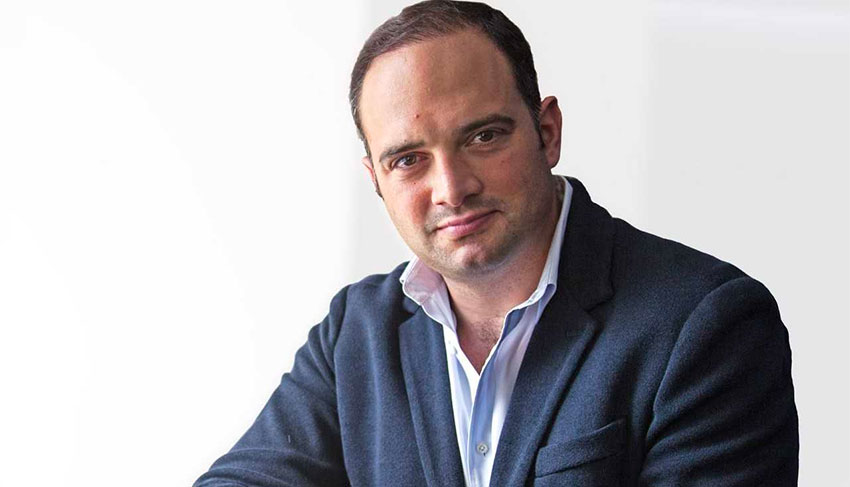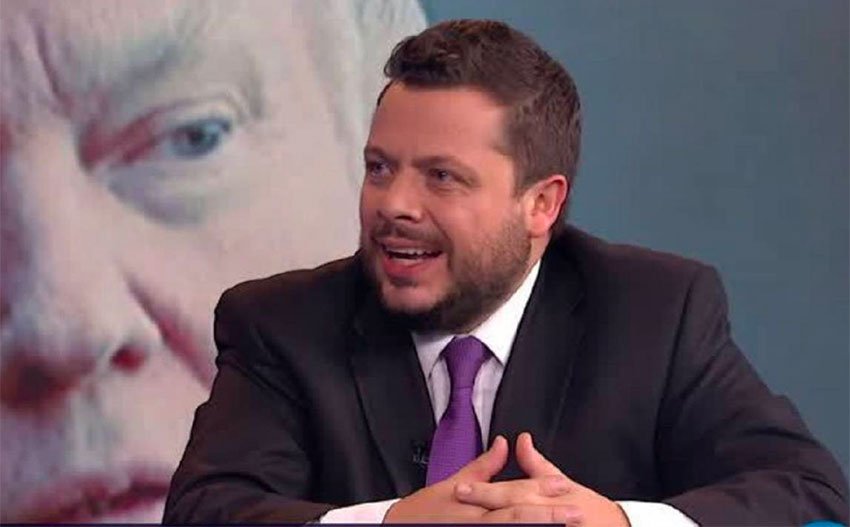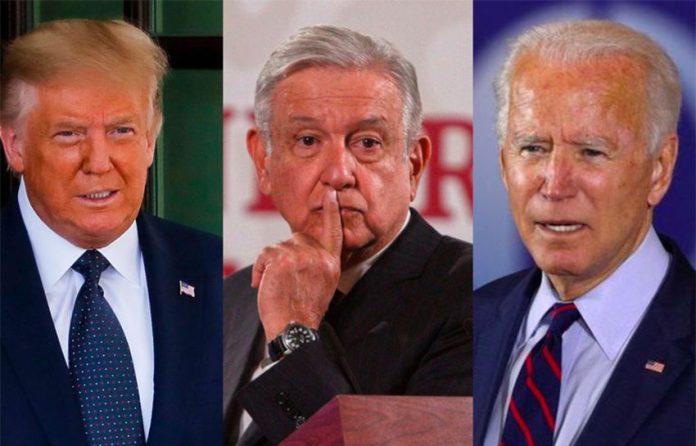President López Obrador has rejected any suggestion that there could be reprisals against Mexico for his decision not to not recognize Joe Biden’s victory over Donald Trump in the United States presidential election.
Several hours after United States media called the race for Biden last Saturday, López Obrador said he would wait until “all the legal issues” surrounding the election are resolved before congratulating the successful candidate because he didn’t want to be “imprudent.”
At his regular news conference on Wednesday, he ruled out any possibility that Biden will retaliate.
“If we don’t recognize [Biden as president-elect] will there be reprisals? No,” López Obrador told reporters.
“There’s no reason for there to be reprisals because we’re sticking to our … principles [of non-intervention], to our laws. Besides, we’re not a colony, we’re a free, independent and sovereign country. The government of Mexico isn’t the puppet of any foreign government.”
The president reiterated that he won’t recognize a winner of the election until there is greater certainty about the result. To do so now would be “interventionism,” he said.
As congratulations for Biden flooded in from around the world after the U.S. media declared that he had secured enough electoral college votes to win the presidency, Mexico was conspicuous for its decision to not do the same, especially considering the importance of its relationship with its northern neighbor.
Vladimir Putin of Russia, Xi Jinping of China and Jair Bolsonaro of Brazil, who has been described as the “Trump of the Tropics,” were also among the small group of world leaders who chose to withhold congratulatory remarks to the president-elect.
López Obrador, who has unexpectedly developed a friendly relationship with Trump and visited him in the White House in July, has been widely criticized for his failure to congratulate Biden, although some observers concluded that he is in fact being prudent given that the U.S. president still has time to take decisions that could have a negative impact on Mexico.
“The crazy guy could close the border, deport people or [do] something else that could cause a lot of damage to Mexico and to our compatriots,” said Genaro Lozano, a political analyst and columnist.
In contrast, León Krauze, a journalist and news anchor, was highly critical of López Obrador’s stance. Writing in The Washington Post, Krauze said the president’s decision not to recognize Biden’s victory “tacitly” validated “Trump’s mission to delegitimize the electoral process.”

That shouldn’t surprise anyone, he wrote, charging that it was the “next logical step” in López Obrador’s “subservient” relationship with the U.S. president.
Krauze claimed that AMLO, as the president is known, “has chosen to appease” Trump “at every turn,” noting that in order to avoid blanket tariffs on Mexican exports he agreed to militarize the southern border and comply with the United States government’s controversial policy of sending migrants to Mexico to await the outcome of their asylum claims in the U.S.
The columnist also criticized López Obrador for heaping praise on Trump during his trip to Washington.
“After such indignity, granting credence to Trump’s legal challenges of the electoral process in the United States should be an expected, if sad, progression,” he wrote.
Krauze also acknowledged that AMLO’s own personal experience in close contested elections was a factor in his decision.
When he was narrowly defeated by Felipe Calderón at the 2006 election, López Obrador “cried fraud and set out to delegitimize the election,” he wrote.
“He demanded a recount. When the process failed to vindicate his allegations of electoral wrongdoing, López Obrador proclaimed himself the ‘legitimate president’ of Mexico and declined to recognize Calderón as the country’s lawful leader, dismissing him as ‘spurious.’”
Krauze noted that AMLO also refused to accept his 2012 defeat to Enrique Peña Nieto but “reconciled” himself with Mexico’s democratic institutions when he prevailed at the 2018 election.
“This dynamic is now becoming eerily familiar to U.S. voters. Like López Obrador, Trump believes in democracy only when it benefits him. Any adverse result is suspect, potentially fraudulent, illegitimate,” he wrote.
“Given their shared narcissistic and conspiratorial mind-set, why would López Obrador turn his back on Trump now? Why acknowledge Biden’s victory if, perhaps, he has already opted to believe Trump’s allegations of fraud?” Krauze asked.
After concluding that the Mexican president has already chosen a side, the journalist asserted that “Biden will surely notice.”
However, he didn’t consider the possibility that the president-elect might seek to retaliate once he takes up residence at 1600 Pennsylvania Avenue.

Héctor Diego Medina, a columnist and foreign affairs analyst, acknowledged that AMLO had made a “diplomatic error” in not congratulating Biden but opined that there would be no reprisal against Mexico because the 77-year-old former vice president “is not a vengeful politician.”
But Carlos Bravo Regidor, a prominent political analyst and professor at the Center for Economic Research and Teaching, a Mexico City university, said that López Obrador’s failure to reach out to Biden could have repercussions at home.
“Drawing the analogy between Mexico in 2006 and the U.S. in 2020 puts López Obrador in the awkward position of equating himself with Trump and his baseless fraud allegations,” he said.
“If Mexico does not pick the side of American democracy, the United States will not take the side for Mexican democracy either. Perhaps that is what López Obrador wants, but that is not what’s in the best interest of Mexicans.”
Jesus Velasco, an expert on U.S. Mexico relations at Tarleton State University in Stephenville, Texas, said the decision not to congratulate Biden “will, at least in the beginning, lead to an unpleasant bilateral relation that will complicate Mexico’s relationship with its main trade partner.”
“However, AMLO’s insensibility will not modify the structural relationship” between Mexico and the United States, he said.
A senior Mexican government official who spoke to The Dallas Morning News on the condition of anonymity said that AMLO’s decision is designed to avoid Trump bullying Mexico in his last days in office, but another official said the move was “embarrassing.”
Tony Garza, a former U.S. ambassador to Mexico, said that López Obrador’s refusal to acknowledge Biden was “a fumble of sorts” but not a big deal.
“[The] truth is, the president-elect’s inbox is full of far more pressing matters than AMLO’s unforced errors,” he said.
Writing in The Dallas Morning News, journalist Alfredo Corchado said López Obrador’s failure to pick up the phone and call Biden represented an “inauspicious start” to his relationship with the president-elect. He also said that the relationship between the two men had been “muddied” because López Obrador didn’t make time to meet with Biden when he was in Washington in July.
Noting that Mexico and the United States share a long border and need to cooperate on issues including immigration and trade, the bonds between the two nations “are a top priority,” Corchado wrote. “And they’re fragile.”
Similarly, Shannon O’Neil, a senior fellow for Latin America at the Council for Foreign Relations, said that López Obrador has made a “rocky start” to the relationship with the incoming U.S. president but asserted that Mexico and the United States’ shared geography, history and destiny will ensure that the two countries work closely together.
“Even without any personal bonhomie expect much broader and deeper bilateral discussions to begin on security, environment, labor issues, human rights, corruption and investor rights and protections,” she said.
“After four years of an obsession with just migration, the true broad and deep nature of the U.S.-Mexico relationship will again emerge.”
Source: El Financiero (sp) The Dallas Morning News (en), The Washington Post (en)
